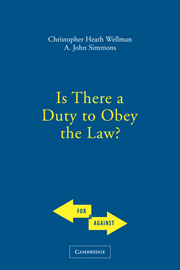8 - Conclusions
Published online by Cambridge University Press: 05 June 2012
Summary
I have discussed the principal variants of Natural Duty theories of the duty to obey the law that are being defended by contemporary political and legal philosophers/theorists. But the influence of this family of theories in fact appears to extend well beyond the self-proclaimed family members. Many theories of the duty to obey that are presented by their defenders in Associative or Transactional language seem in actuality to rest more heavily on Natural Duty foundations. Let me note here just two prominent recent examples of this tendency. The best-known recent defense of an (allegedly) Associative account of the duty to obey – namely, Dworkin's – appears to justify its support for the moral force of Associative ties precisely by appealing (non-Associatively) to a “natural duty” that we have “to honor our responsibilities under social practices that define groups and attach special responsibilities to membership.” Similarly, George Klosko's prominent recent defense of a fairness theory of obligatory obedience (which purports to be a Transactional reciprocation theory [to use my classifications]) seems actually to be far less concerned with fairness, properly understood, than with the needs of those who depend on the public goods states provide. It is the value or importance of these public goods (their “presumptive” status) – and some unacknowledged natural duty to help make them generally available in our society – that seems to ground required obedience in Klosko's theory, not (as should be the case if fairness is really the issue) our acceptance of benefits, our free participation in a genuinely cooperative scheme, or the ways in which refusal to obey would take advantage of others.
- Type
- Chapter
- Information
- Is There a Duty to Obey the Law? , pp. 189 - 196Publisher: Cambridge University PressPrint publication year: 2005



